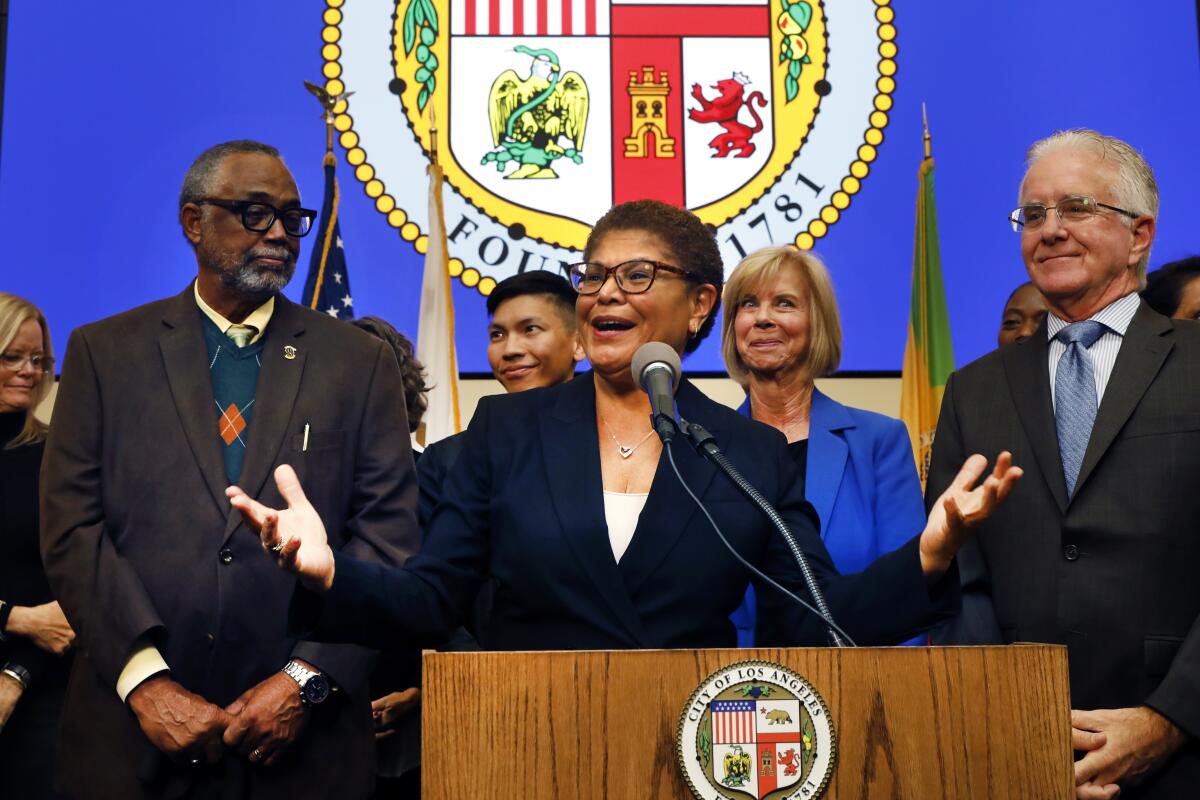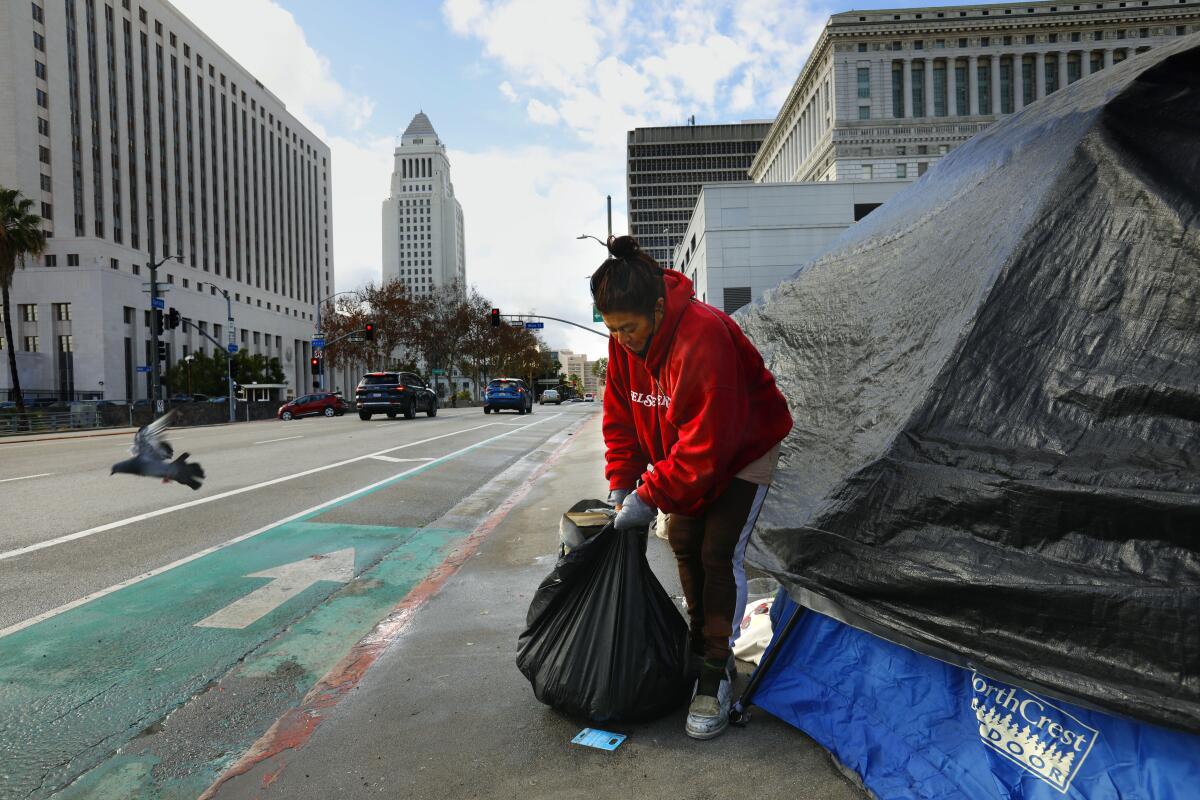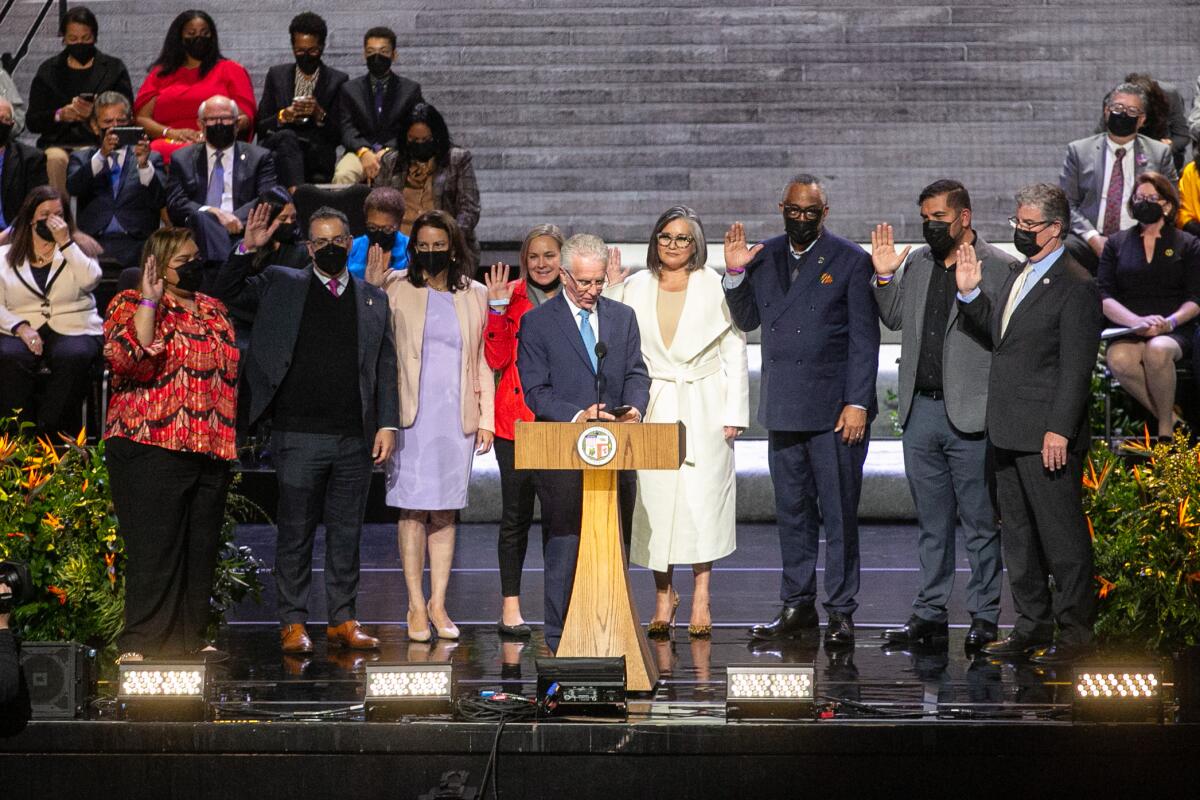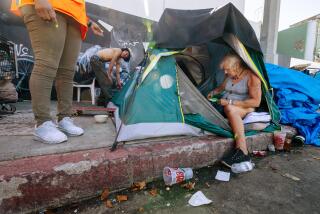An emergency declaration gives Karen Bass new powers. How will she use them?

- Share via
Mayor Karen Bass’ first day in office didn’t start at City Hall but down the street at the Emergency Operations Center where, flanked by elected officials, she declared the homeless crisis a state of emergency.
That move, which will require City Council approval, gives her the ability to more quickly create new interim housing and make a plan to get the most vulnerable Angelenos off the streets as winter weather sets in. Bass met with the general managers of city departments, telling them to bring her solutions to make the government more efficient and responsive when addressing homelessness.
“We must bring people indoors faster, and we will,” she said. “We must build housing faster, and we will. We must coordinate shelter and services, and we will. We must have coordination among the city officials and the city departments and we will, because we are doing things differently.”

The question is how Bass plans to use the powers afforded to her during an emergency. She has the ability to more quickly dispense money to providers who do the outreach work to homeless people, approve the master-leasing of buildings and expedite the regulatory and permitting processes.
Though she could also commandeer property to provide housing, she told The Times’ editorial board she won’t do that because “you’re going to end up tied up in court forever. I’m looking for the quickest way to do this.”
It’s unclear how much this emergency declaration would cost, if passed, or how many units of interim housing Bass plans to create immediately. The latest count found that about 41,000 people are homeless in the city of Los Angeles, with about 28,000 of them unsheltered.
Karen Bass has said she will declare a state of emergency on homelessness in Los Angeles. ‘I realize that I’m taking a huge risk,’ she says.
During the campaign, Bass said she will would bring about 17,000 people indoors in her first year. This week the newly installed mayor said more details would be provided in the coming days about the effort, called “Inside Safe.”
Bass estimated this first push to bring people indoors from encampments would cost “under $100 million” but didn’t elaborate. The state of emergency will “sunset in six months subject to being renewed. The setting of a specific time frame allows for actions to be taken to make permanent, necessary structural changes,” the declaration said.
She was flanked by county Board of Supervisors Chair Janice Hahn and City Council President Paul Krekorian.
“This is a crisis that demands all our attention, our cooperation and our resources,” Hahn said.
The emergency declaration requires City Council authorization every 30 days and is expected to come before the council on Tuesday. This consolidation of power will come at the expense of the council, but Krekorian said he was excited to work with Bass, with whom he served in the Legislature.

“One thing that a state of emergency in the city provides is different procurement processes, for example. So it’d be much easier for us to acquire housing or to acquire the pieces that are needed and so forth,” Krekorian said Monday. “All of these things will be subjected to council oversight, and there will be a limited duration to it.”
Under Mayor Eric Garcetti, the city at one point declared a “shelter crisis” but stopped short of declaring a state of emergency on homelessness. Still, Garcetti’s moves helped speed up the process of siting and building shelters throughout the city.
This move by Bass goes much further.
The declaration would give her additional power to spend money on facilities and services without going through a competitive bidding process. Those expenditures would also not require council approval.
Sarah Dusseault, who has worked on homelessness policy in the city and county and helped Bass develop her strategy, explained that only the mayor has the power to activate the emergency operations center and also strip away some of the regulations and approval processes that tend to slow down projects.
“An emergency declaration, per the charter, comes with enormous local authority that does not exist short of a declaration,” she said. “There’s this hunger among the City Council and city departments around getting clear direction from the mayor, on the most significant issue facing our city. ... There is no question that in a vacuum, everybody just operated to do the best that they could. Today, in one fell swoop, she eliminated the vacuum.”
The Times reported Sunday that Bass will aggressively target large encampments with residents who are desperately in need of help and have been a constant source of frustration for nearby residents. Her advisors have been asking city agencies, nonprofits and council offices for the locations where these large encampments have sprung up.
“Every council member has their own plan,” said Miguel Santana, chief executive of the Weingart Foundation, who also has helped with the mayoral transition. “The tension that’s going to surface is the transition from a culture where it’s each person for themselves, and everyone running their own program, to a system that is centralized and coordinated.”
They have been examining where these people could go at least on a temporary basis — contemplating more hotel conversions, master-leasing of buildings and extending the homeless-housing operation of the nearly 500-room L.A. Grand Hotel downtown.
Bass declined to set a goal of how many beds she wanted rented for homeless people. She did say the work would be modeled on the “encampment to home” approach that was refined throughout 2021 across the city in areas such as Echo Park, MacArthur Park and the Venice Boardwalk.
That work required having a supply of interim housing — usually in the form of master-leased hotels — where people could go quickly while they figured out a more permanent housing solution. Standing beside Bass on Monday were some of the largest homeless services nonprofit providers who had briefed her on their work and needs.
“We have the trust and the engagement already built with many of the people who are still living outdoors,” said Stephanie Klasky-Gamer of LA Family Housing, who serves on Bass’ transition team as well. “What we haven’t had on hand are the beds.”
Jennifer Hark Dietz, chief executive of People Assisting the Homeless, said it sent an important message that Bass asked organizations like hers to be there Monday, because they are doing the work on a day-to-day basis. She said Bass appeared very much to understand that offering people services and housing would be much more successful than a strategy the relies on punishing people for where they bed down at night.
“The city’s approach to homelessness has become more piecemeal and politicized, and this state of emergency can leverage the power of the executive branch to make sustainable improvements to our service system and dramatically increase the production of desperately needed housing,” she said.
More to Read
Sign up for Essential California
The most important California stories and recommendations in your inbox every morning.
You may occasionally receive promotional content from the Los Angeles Times.












